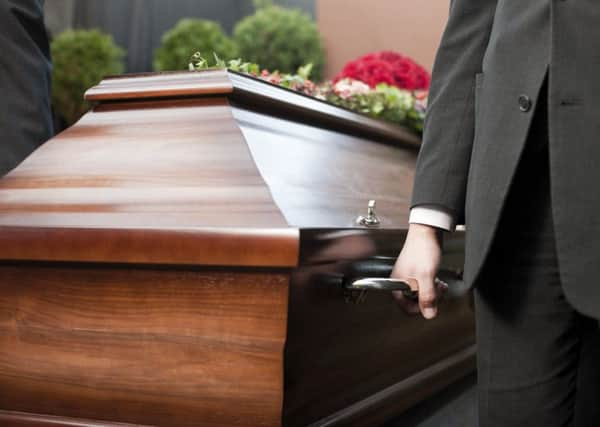Debt woe for bereaved as funeral costs soar


That’s the warning this weekend as a panel set up by the Scottish Government puts the finishing touches to its report on the issue.
The average funeral in Scotland now costs nearly £3,500, Royal London revealed in October, and the International Longevity Centre UK predicts that average funeral costs could be double that by 2020.
Advertisement
Hide AdAdvertisement
Hide AdAbove-inflation increases in costs in recent years have left a growing number of low and middle income families struggling to afford funerals for loved ones, often turning in desperation to high-cost borrowing such as payday loans.
The Scottish Working Group on Funeral Poverty is looking at ways of lowering costs, supporting people unable to fund funerals and measures that could be taken by national and local government, insurers and the funeral industry.
The review is being led by John Birrell, a bereavement consultant, who said it wanted to find ways of mitigating the effect of rising funeral costs on those with low incomes.
“If we cannot find ways to reduce the costs, or increase the resources, the alternative is to look at new ways of saving for a funeral, or to challenge our perception of what all needs to be purchased within a funeral arrangement,” said Birrell.
The draft findings are expected to be submitted to the Scottish Government before Christmas, with Citizens Advice Scotland (CAS) publishing the full report next month.
Funeral poverty is also the subject of an inquiry by the Commons Work and Pensions Committee, which will look at the financial support available to people who lose someone they had depended on financially.
Funeral costs have been driven up by several factors, with the burial fees charged by local authorities among the most prominent.
CAS revealed in May that Scottish local authorities had raised burial fees by 10 per cent in the previous year, taking the average to nearly £1,300.
Advertisement
Hide AdAdvertisement
Hide AdBurial fees can vary hugely between different local authorities. Burial costs in Scotland range from less than £700 in the Western Isles to £2,785 in East Dunbartonshire, CAS found, with similar disparities in cremation costs.
All but two of Scotland’s 32 local authorities had increased their fees, according to CAS, which said families were going deeper into debt just to cover the basic costs.
The full expense of arranging a funeral can climb far higher when funeral director fees, public notices, catering, memorial, orders of service, flowers and other fees are added.
The average funeral in Scotland costs £3,481, according to Royal London research published in October. The increase of 2.4 per cent was the lowest in the UK, however, after doctors’ fees were removed in May from the costs facing Scottish families.
But while funeral costs have increased at a rate far outstripping inflation in recent years, the value of the Social Fund Funeral Payment – designed to cover basic funeral costs for those unable to afford them – remains at the 2003 level of £700.
“As austerity continues to pinch causing more and more people to experience poverty, the value of the Funeral Payment, introduced to replace the death grant in 1998 and intended to make funerals affordable, has continued to decline in real terms,” said Birrell.
“The resulting gap, between the cost of the funeral and the resources a person has to pay the funeral account, is where we identify funeral poverty.”
For those on benefit and with no resources to fall back on this can leave them with an average shortfall of £2,316, said Birrell.
Advertisement
Hide AdAdvertisement
Hide Ad“For those already on the verge of unsustainable debt this will push them over the edge; for those already in debt it is yet another weight pressing them down,” he added.
Two-thirds of funerals are paid for out of ordinary savings, Royal London found, while a fifth are covered by pre-paid funeral plans and 18 per cent by some form of insurance policy.
Among the leading providers of funeral plans are Age UK, Dignity and Sunlife.
Logan Steele, general manager for Age Scotland Enterprises, said: “Our own research has found that almost 2.1 million people aged 60 and over don’t know how the cost of their funeral would be met and almost two-thirds have not made any plans for their funeral as yet. This highlights the need for us all to think seriously about these matters.”
But the entire system of arranging funerals is in “desperate need of reform”, he added.
“We would hugely welcome any possibility of state financial support for funeral costs, especially for those most in need, and not dissimilar to the system of Cold Weather Payments, which is successful and provides essential support to older people in Scotland. “
He also called for standardised burial and cremation charges.
“It simply isn’t fair that people in East Dunbartonshire are currently paying four times as much as those in the Western Isles. Change needs to be made so that it is fairer for all.”